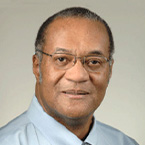
Eddie Reed, MD, clinical director of the National Institute on Minority Health and Health Disparities (NIMHD) of the National Institutes of Health (NIH) in Bethesda, Maryland, died May 28, 2014, at the age of 60. Reed, a world-renowned cancer expert, joined the AACR in 1987 and served on numerous boards and committees, including the board of directors and served as chair of the Minorities in Cancer Research (MICR) Council.
Born Dec. 17, 1953, in rural Arkansas, Reed received his bachelor’s degree from Philander Smith College in Little Rock, Arkansas, and his medical degree from Yale University School of Medicine in New Haven, Connecticut. He completed his internship and residency at Stanford University in Palo Alto, California, and a fellowship at the National Cancer Institute (NCI) in Bethesda.
Reed was known internationally in the cancer research field for his two interests, cancer drug development and cancer care for the underserved. His clinical research primarily focused on DNA damage and repair in cancer cells. Reed was recognized as an authority on the actions and use of the anticancer agents paclitaxel and cisplatin, and collaborated on many public health cancer prevention, screening, and control programs.
Prior to his recruitment to the NIMHD in 2012, which was established in an effort to improve minority health and eliminate health disparities, Reed was a professor of oncologic sciences and the Abraham Mitchell distinguished investigator at the University of South Alabama Mitchell Cancer Institute in Mobile. He had served as chief of the pharmacology branch and chief of the Ovarian Cancer and Metastatic Prostate Cancer Clinic in the Division of Clinical Science at the NCI; he was the first African-American branch chief to serve at the institute. He had also served as director of the Mary Babb Randolph Cancer Center at West Virginia University in Morgantown, and director of the Division of Cancer Prevention and Control at the Centers for Disease Control and Prevention in Atlanta.
Reed was a very active AACR member for 27 years; in addition to his election to the board of directors and MICR Council chair, he also served on the MICR-Jane Cooke Wright Lectureship Award Committee and the Research Grant Review Committee. Additionally, he served on the Cancer Prevention Research and Molecular Cancer Therapeutics editorial boards, and was a member of several other committees, including the Annual Meeting 2011 Program Committee and the Award for Lifetime Achievement in Cancer Research Committee.
Reed had also served on the National Advisory Council on Minority Health and Health Disparities and on the Institute of Medicine’s National Cancer Policy Forum. He twice received the United States Public Health Service Commendation Medal.
Reed was preceded in death by his son, Edward. He is survived by his wife, Meenakshi, several siblings, and a large extended family.
I am fellow Classmate of Eddie from Hughes, Arkansas and Philander Smith College. We graduated the same year, cum laude. I was a minister, but he encouraged me to become a MD, a graduate of Yale University of School. I latter returned to ministry. He is a wonderful man, friend, competitor and brother. Scyrus Cartwright, MD, MDiv, MPH.